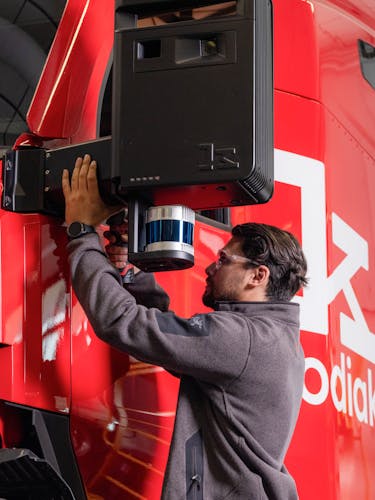LANCASTER, Texas — Kodiak Robotics Inc. has released data from the first year of its Enhanced CMV Inspections Program (Enhanced Inspections) for for its truck.
According to an Aug. 20 press release, in April 2023, Kodiak became the first self-driving trucking company to launch an Enhanced Commercial Motor Vehicle Inspection Standard (Enhanced Inspections) program as set forth by the Commercial Vehicle Safety Alliance, allowing its trucks to pre-clear fixed-site inspections, such as weigh stations.
“Texas is proud to be the first state to pilot the Enhanced Inspections program, in collaboration with Kodiak, Drivewyze and other leaders in the autonomous trucking industry,” said Captain Bart Teeter, Texas Department of Public Safety. “The CVSA’s Enhanced Inspection program lays a strong foundation for autonomous truck safety that has the potential to help raise standards across the trucking industry and make Texas highways safer.”
In partnership with the Texas Department of Public Safety, Kodiak has performed Enhanced Inspections on more than 1,000 assets, including both autonomous tractors and traditional trailers. Key findings in the first year include:
- Of the defects identified, 95% were found on trailers (which are not generally owned by Kodiak), and only 5% were found on tractors. According to the press release, this indicates that trailers are far more likely to have safety defects than tractors.
- 59% of Kodiak’s partners’ trailers passed their Enhanced Inspections, but 70% of trailers from these same partners passed a traditional inspection. The release added that this result highlights the high standards of Enhanced Inspections, which can be applied to the traditional inspection process for increased road safety.
“CVSA is encouraged by the results of the pilot in Texas, and we are excited about the potential of our Enhanced CMV Inspection Program and its ability to ensure the safety and roadworthiness of autonomous trucks,” said Collin Mooney, executive director of the Commercial Vehicle Safety Alliance. “The inspection program for autonomous truck motor carriers was the result of collaboration between law enforcement leaders from across North America and leaders from the autonomous trucking industry.”
According to the release, autonomous trucks represent a unique opportunity to increase the safety of America’s freight ecosystem.
“Autonomous trucks never get distracted or drowsy, they don’t check their phones, and they’re programmed to comply with the rules of the road,” Kodiak said in the release. “The potential benefits of autonomous trucks cannot be realized without a strong inspections regime that demonstrates to the public the roadworthiness of autonomous trucks. That being said, the traditional roadside inspection regime is a problematic fit for autonomous trucks.
“Most importantly, traditional Commercial Vehicle Safety Alliance (CVSA) North American Standard Level I Inspections require cooperation between drivers and enforcement during the inspection process — drivers are responsible for testing indicator lights, stepping on brake pedals, and otherwise demonstrating that key truck safety systems are operating properly. Conducting such an inspection without a driver in the cab raises significant challenges for fleets and law enforcement alike. Additionally, a core rationale for the roadside inspection regime is ensuring that drivers themselves are compliant with critical safety regulations, including hours of service.”
Once an autonomous truck is on the road, it must have the capacity to digitally communicate a Safety Data Message Set, which includes the outcome of the Enhanced Inspection as well as other relevant safety information, to roadside enforcement officers at inspection sites. This process ensures law enforcement has a high level of certainty about the roadworthiness of vehicles participating in the Enhanced Inspection program. While officers will retain the authority to pull over a truck should they have probable cause, vehicles participating in the Enhanced Inspection program will receive bypasses for routine inspections.
According to the release, as part of the pilot program, Kodiak inputs the results of each Enhanced Inspection into the Drivewyze system, which then wirelessly communicates the Safety Data Message Set to roadside enforcement officials in three inspection sites in Texas. The communication between the autonomous truck and enforcement officers, using the Drivewyze platform, is seamless to officers.
“The success of the Enhanced Inspections pilot program demonstrates that Enhanced Inspections can solve a critical regulatory and safety hurdle to the commercial deployment of autonomous trucks,” the release said. “This significant experience can help guide regulators at the Federal Motor Carrier Safety Administration, state and local law enforcement, CVSA, and others as they look at potentially both expanding Enhanced Inspections, as well as adopting portions of the program for traditional trucks.”
Pilot Findings
Since launching its Enhanced Inspections pilot in April 2023, Kodiak has performed Enhanced Inspections on over 1000 assets, including both autonomous tractors and traditional trailers, the release said. Over the course of these inspections, Kodiak has identified over 525 defects. Of those defects, 5% were found on tractors and 95% were found on trailers.
“The fact that trailers comprised the vast majority of defects is unsurprising,” the release said. “Kodiak already routinely inspected its own assets every day, and therefore has deep knowledge of the condition of those vehicles. On the other hand, typically uses its customer trailers, so each new load Kodiak hauls typically comes on a trailer that has never previously received an Enhanced Inspection.”
Opportunities for Process Improvement
The release also noted that, on average, Enhanced Inspections take 38 minutes to complete for a combination vehicle, or 32 minutes for a tractor only and 20 minutes for a trailer only.
“This is significantly more in depth than a typical daily driver pre-trip inspection, which, when performed properly, typically takes 15-20 minutes,” the release said. “Based on Kodiak’s experience, there are opportunities to streamline the inspections process without compromising safety. In addition, there is an opportunity to specifically enable the use of both AV self-diagnostic technologies and technologies like camera-based visual inspections and tire/alignment inspection devices. These technologies can not only speed the inspections process but can help provide archived data that can further help improve safety. Additionally, as Enhanced Inspections become more prominent, it will be necessary to scale the training program to allow for a higher frequency of trainings and volume of inspectors.”
Conclusions
“The Enhanced Inspection program itself encourages fleets to achieve high maintenance standards,” the release said. “Given that every Kodiak tractor regularly receives an Enhanced Inspection, Kodiak has unique insight into its vehicles’ wear and tear. The Enhanced Inspections program therefore essentially becomes a robust proactive maintenance program that enables Kodiak to identify and correct issues before they become defects.”
According to the release, Kodiak’s data suggests that Enhanced Inspections have the potential to raise safety standards across the industry.
“The in-depth trailer inspection required for Enhanced Inspections adds an additional safety benefit even after an autonomous trip,” the company said. “Indeed, several Kodiak partners have given the feedback that, rather than dislike Kodiak’s high trailer rejection rate, they appreciate the additional visibility Enhanced Inspections provide into their own trailer pools and have used that visibility to improve their own trailer maintenance processes.”
The release noted that Kodiak’s first year piloting Enhanced Inspections suggests the program has the potential to raise safety standards while providing law enforcement, regulators, and the public with additional confidence regarding the roadworthiness of autonomous commercial motor vehicles.
“While there is more work to do both to refine Enhanced Inspection standard and expand it to additional jurisdictions, we believe the program represents a strong foundation for enforcement for autonomous trucks,” the release said. “Additionally, the quantity of defects found by Kodiak during the inspection process suggests that the certified pre-inspection model represents a genuine opportunity to raise safety standards across the trucking industry.”
On the trailer side, 59% of Kodiak’s partners’ trailers passed their Enhanced Inspections.
“This finding likely reflects multiple factors. First, certified Enhanced Inspectors have a higher level of training and expertise than the typical driver conducting a Driver-Vehicle Inspection Report (DVIR) – they are therefore more likely to catch defects,” the release said. “More generally, trailers are often less well-maintained than tractors, both because trailers typically have longer replacement cycles than tractors, and because trailers often do not get serviced as frequently as tractors. Interestingly, 70% of trailers from these same partners passed a traditional DVIR, suggesting that the thorough nature of the Enhanced Inspections procedure can uncover additional safety defects beyond even a well-executed DVIR.”








self driving trucks a a danger to humans life’s on the road we all hope it fails to save life’s and is banded from road ways